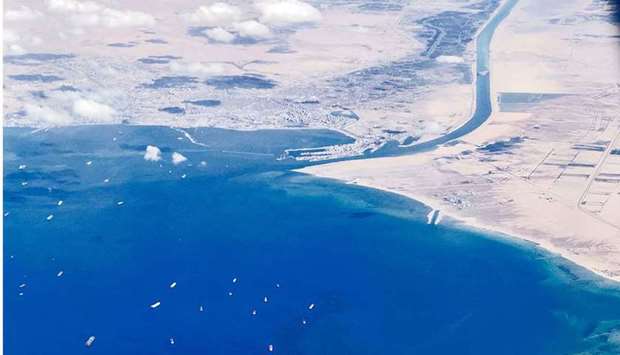* Preparations underway to remove some of ship's containers
* Canal Authority raises prospect of compensation
* 369 ships now stuck due to stranded vessel
* Blockage costing canal $14-15 million daily
Suez Canal salvage teams were alternating between dredging and tugging on Sunday to dislodge a massive container ship blocking the busy waterway, while two sources said efforts had been complicated by rock under the ship's bow.
Dredgers working to dislodge the stranded vessel have so far shifted 27,000 cubic metres of sand, to a depth of 18 metres, and efforts would continue around the clock according to wind conditions and tides, the Suez Canal Authority (SCA) said in a statement.

A view shows Ever Given container ship in Suez Canal in this Maxar Technologies satellite image taken today.
Egypt's President Abdel Fattah al-Sisi has ordered preparations for the possible removal of some of the ship's 18,300 containers, SCA Chairman Osama Rabie told Egypt's Extra News.
Any operation to lighten the ship's load would not start before Monday, an SCA source said, as salvage teams try to take advantage of high tides before they recede next week to manoeuvre the ship free.
The 400-metre long Ever Given became jammed diagonally across a southern section of the canal in high winds more than five days ago, halting shipping traffic in one of the world's busiest waterways.
At least 369 boats are waiting to transit the canal, Rabie said, including dozens of container ships, bulk carriers, oil tankers and liquefied natural gas (LNG) or liquefied petroleum gas (LPG) vessels.

A view shows the stranded container ship Ever Given
Shippers affected by the blockage may be offered discounts, Rabie said, adding that he believed investigations would show the canal was not responsible for grounding the Ever Given, one of the world's biggest container ships.
Rescue workers from the SCA and a team from Dutch firm Smit Salvage have been weighing how much tugging power they can use on the ship without risking damage, and whether some cargo will need to be removed by crane in order to re-float it.
Experts have warned that such a process could be complex and lengthy. Rabie said he hoped it would not be necessary, but that Egypt would take up offers of international assistance if it did switch to that strategy.
A ballast tank at the bow of the ship has been damaged, and the vessel will have to be inspected once it is freed, two people familiar with the salvage operation said.
"There are positive indicators from yesterday and the day before yesterday," Rabie told Egyptian state TV.
"The rudder was not moving and it is now moving, the propeller is working now, there was no water underneath the bow, and now there is water under it, and yesterday there was a 4-metre deviation in the bow and the stern."
However, two SCA sources told Reuters that a mass of rock had been found at the bow of the ship, complicating salvage efforts.
From the dredging done so far it was still unclear whether the ship was stuck on soft sand, compact sand or clay, which will determine how easily it may shift free, said one official involved in the salvage operation.
Two more powerful tugs are expected to arrive by Monday. "We believe that is what you are going to need in terms of horse power ... to have a decent attempt, a decent chance of trying to float her," the official said.
"We're dividing the day into two halves, 12 hours for dredgers and 12 hours for tugs, because not all times are suitable for tugs due to the tide," said Rabie, adding that 14 tug boats in total were being deployed.
About 15% of world shipping traffic transits the Suez Canal, which is a key source of foreign currency revenues for Egypt. The current stoppage is costing the canal $14-15 million daily.
Shipping rates for oil product tankers nearly doubled after the ship became stranded, and the blockage has disrupted global supply chains, threatening costly delays for companies already dealing with Covid-19 restrictions.
If the blockage drags on, shippers may decide to reroute their cargoes around the Cape of Good Hope, adding about two weeks to journeys and extra fuel costs.
The SCA has said it can accelerate convoys through the canal once the Ever Given is freed.

